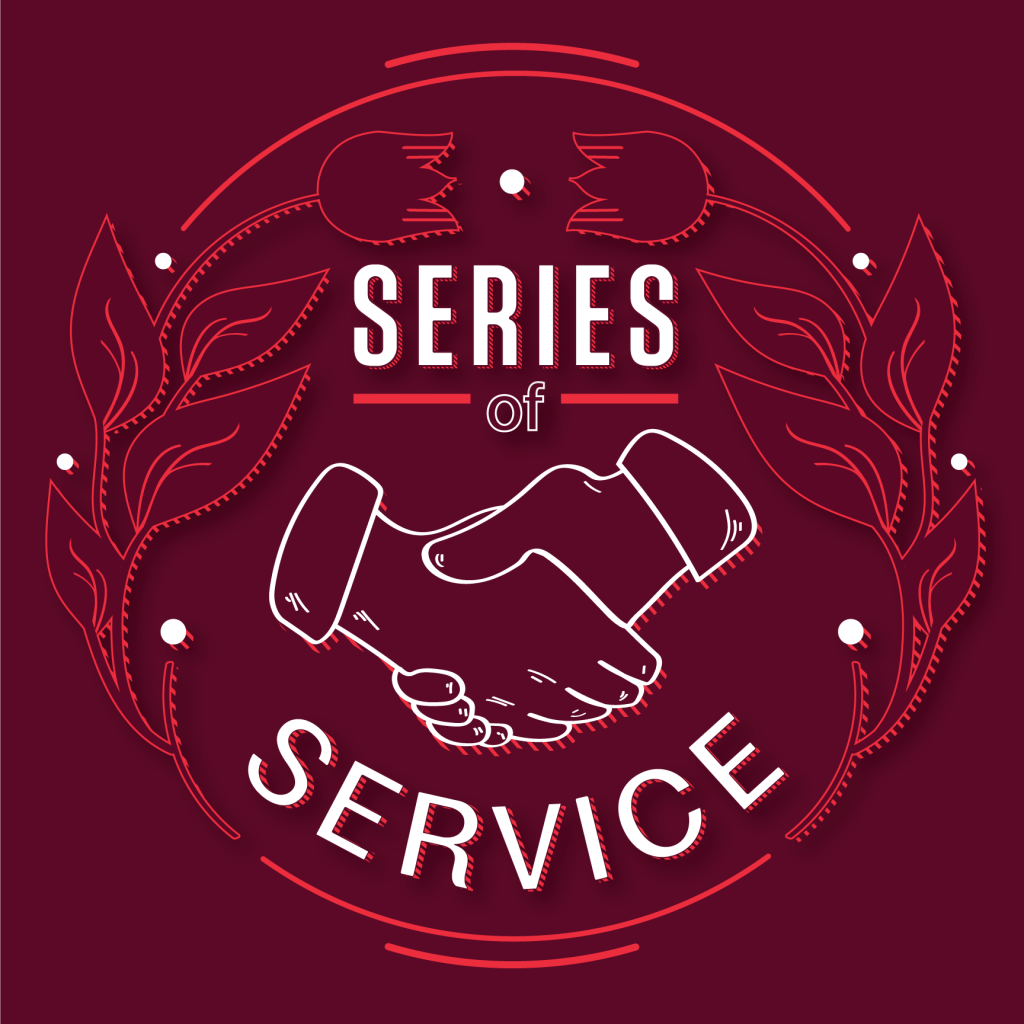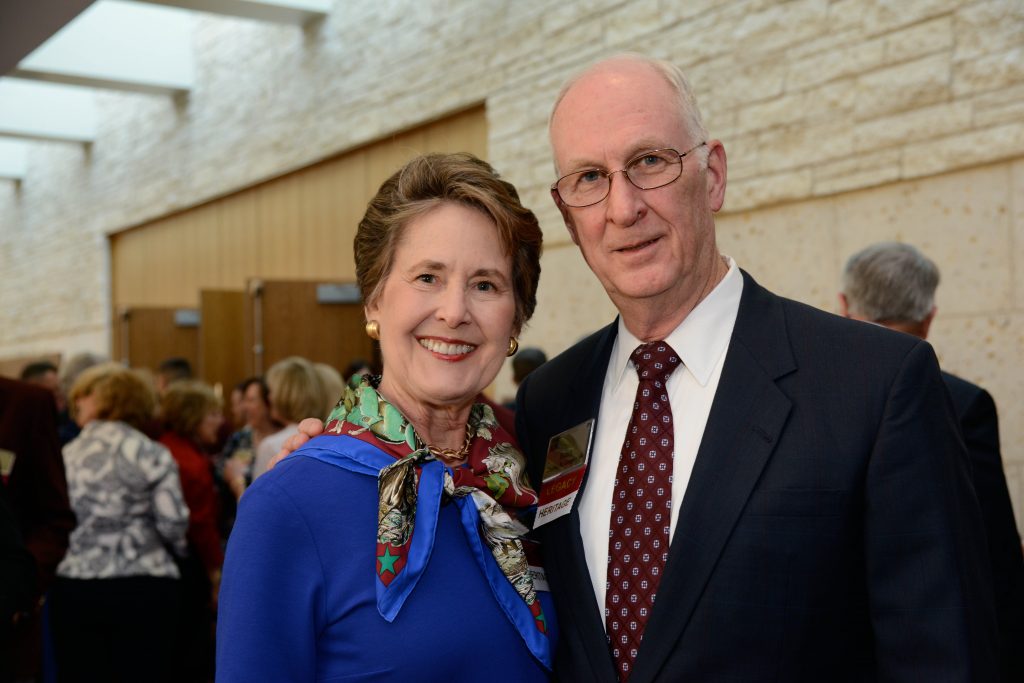Charles Gregory ‘64: “I thought Texas A&M was where everyone would go if they could”
As we close in on the Vision 2020 campaign, Charles Gregory ‘64 reflects on the importance of supporting the liberal arts to place Texas A&M among top ranked public universities.

By Rachel Knight ‘18
Editor’s Note: The following is a Series of Service feature from the College of Liberal Arts.
The series highlights individuals who give generously of their time and resources as members of either the Liberal Arts Development Council or the Liberal Arts Advisory Council. Life-long learning and humanities research that matters at Texas A&M University would not be possible without this support.

Charles Gregory ’64, pictured here with his wife Mary, supports the College of Liberal Arts to help Texas A&M be ranked in the top 10 public universities in the United States by the year 2020.
Serving as a commissioned officer in the Army intelligence branch during the Vietnam War provided Charles Gregory ‘64 time for detached thought about his future. He’d already earned an economics degree from Texas A&M University and a law degree from the University of Texas, but he hadn’t particularly liked law school.
He had developed an interest in the financial markets, and went to work for a regional securities firm after completing his two-year commitment to the Army. Gregory worked for about seven years at the firm working with smaller companies and enjoyed the working business environment. Eventually, the opportunity to acquire a small business came, and he took it.
Over the next 30 years, Gregory acquired and managed a number of small businesses, spending the majority of his career in the owner-managed business environment. We chatted on the phone with Gregory to learn more about his story. We hope you enjoy this interview, which was condensed and edited for clarity.
Tell me about your childhood.
I was born in Henderson, a small town in east Texas. My father, who was a 1932 graduate of Texas A&M University, had the good fortune, at the depth of the Great Depression, to get a job with the Texas Company, which is now called Texaco. They sent him to the new oil field in east Texas, and that’s where he met my mother who was raised there. They got married and started their family.
When World War II broke out, my dad was called up immediately. He’d just taken a new job in Houston, and my parents were planning to move to Houston when he was called to active duty. Amazingly when the war was over, he moved to Houston to take that same job four years later.
My first memories are associated with that move to Houston, which occurred in January of 1946. The childhood I remember was entirely in Houston. It was a very ordinary, suburban childhood — public schools, simple neighborhood where all the houses looked largely alike.
Why did you decide to study at Texas A&M?
The most significant contributor was the fact that my dad went to Texas A&M. He never really pushed Texas A&M on us, but when we went to football games, it was usually a Texas A&M game. Occasionally we went to a Rice game in Houston.
“I thought Texas A&M was where everyone would go if they could.” Two of my mother’s brothers also went to Texas A&M, so we were essentially a Texas A&M family.
How did your time as a student at Texas A&M compare to your dad’s time as a student at Texas A&M?
There were a lot of similarities, because this was before the big change at Texas A&M. When I enrolled, it was still essentially an all-male military school. There were a lot of non-military students there, but there was no real campus cohesion to them like we had the Corps of Cadets.
My dad and I both wore uniforms all day every day, including in classes, and marched to meals. The times had changed, but other than that there was a lot of similarity.
Why did you choose to study economics?
I went to Texas A&M as a pre-law “major” only to get there and find out there is no such major. It’s a degree program pursuant to which one takes a curriculum oriented either towards history or economics. I had some interest in business even then, so economics seemed more logical. My pre-law major became an economics major.
Under the pre-law program, you were in the history or economics program at Texas A&M for three years, and then started law school in Austin and got your Texas A&M degree at the end of the first year of law school. It was parallel to a similar program they had at UT.
Having been an active participant in the Corps, I was not going to forgo my senior year. So, three years of economics became an economics major.
I understand you were a Ross Volunteer. Tell me a little about that experience.
The Ross Volunteers is an elite organization of junior and senior students with the Corps. It serves as the honor guard of the University. The RV’s are the people in white uniforms who serve in special events such as the Silver Taps firing squad and the funeral service of former President Bush. It was an honor to be inducted into the Ross Volunteers and a special honor to be elected the Ross Volunteers commander my senior year, but it also added additional responsibilities to a schedule that was already pretty full.
I was also a company commander in the Corps. The Corps is organized around the military company. We lived together and marched to meals three times a day, six days a week. The Company was your home, your family in the Corps. Being a company commander was a job. Serving as the Ross Volunteers commander was another job.
What role, if any, have the liberal arts classes you took in college played in your life so far?In short, that was my education and adult life preparation. The liberal arts are about the organization and expression of thoughts. An education should provide a person with the ability to accumulate data, organize and analyze the data to an accurate conclusion and then bring it to bear on problems or issues. That is done by communicating the conclusion to others in an articulate way, either orally or in writing. That is what the liberal arts are about.
What is the best advice you’ve received so far in your life?
Get up in the morning, go to work with your head screwed on, and do it every day. A real message I heard someone say a long time ago is, “You can only golf so much. You can only fish so much. The final analysis is the only thing you can do every day is work.” I think that’s correct.
You also have a degree from the University of Texas Law School. What makes Texas A&M stand out as the place you want to support?
First and foremost, it’s my school. It played an important role in my life formation. It’s where the transition from adolescence to early adulthood occurred. The values at Texas A&M are the right kind of values.
Universities like Texas A&M are where the young people of today are getting educated. It’s not places like Harvard or Yale. Schools like Texas A&M are taking what their state provides and turning students into educated, productive people. That’s really important. I can’t think of a school in the country that’s a better example of doing that than Texas A&M.
Why do you support the College of Liberal Arts at Texas A&M?
A major reason is that it’s my college. I started to think more about the college with the Vision 2020 program. It had a stated objective — to come to be ranked in the top 10 public universities in the United States by the year 2020, which we are closing in on. It became clear to me that an important component of achieving the Vision 2020 objectives was going to be the College of Liberal Arts.
What books are on your nightstand right now?
The book I am currently reading is by a man named George Gilder. Gilder started writing about the developing high-tech economy back in the 90s when I first started reading him. He has a new book out called Life After Google: The Fall of Big Data and the Rise of the Blockchain Economy.
What is your vision for Texas A&M in the future?
The Vision 2020 program is a pretty good place to start. As I recall, there were 10 planks of the 2020 report. One of those places emphasis on the liberal arts, and I like to think I had some influence on that.
I can remember in one of those discussion panels there were comments made like, “We’re in this big capital campaign and everyone has to share equally, or share according to what your college produces.” I said, “If that’s the case, you can forget the 2020 objective. Unless a disproportionate emphasis is placed on the liberal arts, you don’t get there.”
I think that was accurate, and it ended up being one of the planks in the 2020 report.
